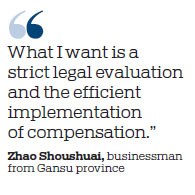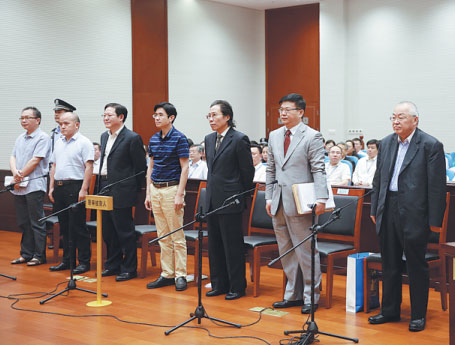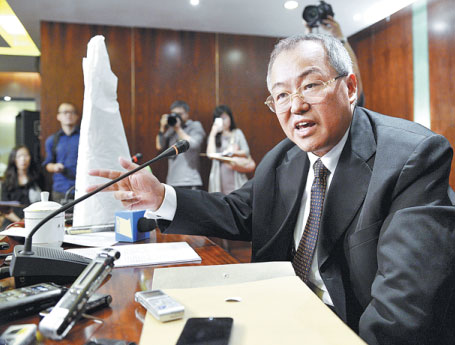Govt pledges support and security for entrepreneurs
Authorities ordered to ensure safety of asset and property rights. Cao Yin reports.
Zhao Shoushuai's New Year's resolution is to rebuild his farm machinery business and restore his reputation in the community.

Last year, the 49-year-old businessman from Gansu province cleared his name, having spent more than a decade in prison and detention as the result of a flawed conviction.
"When I heard that the central leadership was determined to protect the legal and personal property rights of imprisoned entrepreneurs, I felt the sun had come out," he said. "I believe I'll have a bright future in the country's improved legal and business environment."
Under Chinese law, both individuals and companies can be charged with offences such as fraud or illegal business activity. Convicted companies are closed and selected assets and property are seized to compensate the victims.
However, according to Jiang Ping, professor of law at the China University of Political Science and Law in Beijing, judicial authorities often fail to distinguish clearly between legitimate assets, which should not be confiscated, and an entrepreneur or company's personal and/or illicitly gained assets, which can be seized in the event of wrongdoing.
Confiscation

In 1999, Zhao was arrested and detained on a charge of contract fraud. In 2002, he and his farm machinery company were convicted at Xinxiang Intermediate People's Court, Henan province.
Zhao was sentenced to 16 years in prison, and his assets, including property, were confiscated.
However, on July 24, after a retrial at the same court both convictions were quashed as a result of insufficient evidence and violations of legal procedures at the original hearing.
Following that, Zhao applied to the court for State compensation of about 2 billion yuan ($295 million).
In an exclusive interview, Zhao told China Daily that he had asked for the large amount not only as recompense for his wrongful detention, but also to restore his company's operations and reputation.
"As an entrepreneur, my business means everything to me," he said.
Zhao's case was not an isolated incident. Since the 18th National Congress of the Communist Party of China in 2012, the protection of property and asset rights has been strengthened nationwide, resulting in a number of convictions of businesspeople being overturned.
In these cases, the courts ruled that the convicted parties - all entrepreneurs - had been involved in financial disputes, not financial crimes.
As such, they should not have been subject to criminal proceedings or prison sentences, which not only deprived them of their freedom but also damaged their businesses. Rather than custodial sentences if convicted, they should have faced fines.
This year, the protection of property and asset rights has been designated a major task for governments at all levels, and has also been given priority status on the economic agenda.
Chen Guangzhong, a professor of law at the China University of Political Science and Law, praised the recent efforts to safeguard entrepreneurs, but said the legal protection does not go far enough "and the business environment also needs to be further improved".
Wrongful conviction
Zhao's life changed on Jan 15, 1999. The owner of a business in Yongchang county, Gansu province, that sold agricultural machinery, was arrested by police in Xinxiang, Henan province.
Three years later, Xinxiang Intermediate People's Court found him guilty of contract fraud because he had accepted delivery of 142 tractors from a company in the city, but didn't pay the 760,000 yuan bill.
Zhao claims the failure to pay was an oversight. "My business had turnover of millions of yuan every year. I had no reason not to pay the 760,000 yuan to the tractor company," he said. "It was a financial misunderstanding, just a dispute between two companies."

Because the case was treated as a criminal matter, rather than a financial dispute, Zhao received a prison sentence, not a fine. "I felt the sky was falling in when I heard the judgment," he said. "My business was closed down, and I became nothing at that moment."
In 2010, after several commutations of his sentence, Zhao was freed. Having spent 11 years and six months in various kinds of detention, he immediately launched an appeal to have the conviction quashed and clear his name.
"I always insisted I was innocent." he said. "After a short period feeling depressed in prison, I realized I could not give up. I told myself that I must save my business, and justice would be on my side."
In September 2016, prosecutors in Henan appealed the verdict at Henan High People's Court, pointing to errors and a lack of evidence.
About six months later, the court overturned the original judgment and sent the case back to the intermediate people's court for retrial.
Zhao was overjoyed and grateful when the convictions against him and his company were quashed last year, and he hit the headlines in November after the court in Xinxiang filed his claim for State compensation.
"I asked for such a large amount mainly to rebuild my business and begin operating again," he said. "I only applied for personal compensation of 2 million yuan."
The court is still evaluating his losses in terms of earnings, assets and property.
"I don't really care about how much money I will receive. What I want is a strict legal evaluation and the efficient implementation of compensation," he said.
Essential sector
According to Ma Bin, vice-president of the China Association of Small and Medium-sized Enterprises, in recent years, the government has redoubled efforts to encourage non-State businesses and safeguard entrepreneurs' property and asset rights in recognition of the private sector's contribution to economic growth
Speaking in November at a seminar on legal protection for private enterprises, Ma emphasized that the private sector is a key driver of the economy.
"More than 90 percent of small and medium-sized enterprises are non-State-owned businesses. They have provided more than half the country's annual national tax revenues in the past few years. They have also promoted technological innovations and boosted employment and GDP," she said.
Zhou Shaojie, an associate professor of economics at Tsinghua University in Beijing, echoed Ma's comments, saying private enterprise made a great contribution by soaking up excess labor when the nation's State-owned enterprises were reformed in 1998.
"The reform left many people unemployed. However, thanks to private businesses offering a huge number of job opportunities, we overcame the difficulties and pushed forward with the development of the economy," he said.
Ma and Zhou agreed that in light of those developments, any infringements of the legitimate rights of private businesses and entrepreneurs should be punished, while their legitimate operations should be protected in accordance with the law.
Chen, the law professor, said: "We must clearly define the difference between financial crimes and financial disputes. We should not impose criminal penalties on entrepreneurs involved in disputes."
Growing protection
Protection of property and assets has been strengthened regularly since the 18th CPC National Congress. In 2016, the CPC Central Committee and the State Council, China's Cabinet, issued a guideline on improved protection of property and asset rights in an effort to bolster public confidence and promote social justice.
The guideline ordered governments at all levels to provide equal, comprehensive and legal protection of property rights, and stipulated that businesses in the private sector must be treated fairly. For example, the regulation said no assets or property can be confiscated without solid evidence to prove they were obtained illegally.
In 2016, the Supreme People's Court, the nation's highest judicial body, established a special team to urgently review all suspected flawed property and asset-related cases since 1978, and to scrutinize court rulings related to entrepreneurs and private businesses punished for alleged misconduct.
As a result, the court announced retrials in three major cases linked to property rights.
In May, a significant step toward better protection of rights was taken when the conviction of Zhang Wenzhong, former chairman of retail company Wumei Holdings, on charges of fraud, bribery and embezzlement was quashed.
Two other cases - one involving Gu Chujun, former chairman of refrigerator maker Guangdong Kelon Electrical Holdings, the other relating to agricultural machinery maker Jiangsu Muyang Co - were retried last year. The results are yet to be released.
More support
The moves to overturn wrongful convictions and protect the legitimate rights of entrepreneurs have accelerated in recent months.
In November, President Xi Jinping said the country will unswervingly encourage, support and guide the development of the nonpublic sector and support private enterprises.
He demanded the implementation of policies and measures to improve the environment for the development of private businesses, including better ensuring the safety of entrepreneurs' rights, assets and property.
The safety requirement has been highlighted as a major economic task this year.
Last month, the top court reviewed the verdicts in six cases related to protection of property, and five of the rulings were overturned after inconsistencies were discovered.
Although protection is being improved, Xiong Qiuhong, a legal researcher with the Chinese Academy of Social Sciences, said there are still some challenges in handling cases related to assets and property.
"For example, judges have been ordered to prevent financial disputes from being treated as criminal cases, but there is no rule about dealing with cases that involve both criminal and civil aspects. It is not clear which should be tackled first," she said.
The top court said it recognizes the problem, and a new judicial interpretation is being drafted. Meanwhile, several examples of typical cases will be released soon to provide specific guidance for grassroots courts.
Contact the writer at caoyin@chinadaily.com.cn
|
Zhang Wenzhong (front), former chairman of retailer Wumei Holdings, stands in court during a retrial in May. At the conclusion, the court overturned Zhang's conviction.Xu Lixin / For China Daily |
|
|
|
Gu meets with journalists in Beijing in 2012 after being released from prison.Jiang Xin / For China Daily |
(China Daily 01/08/2019 page5)





















